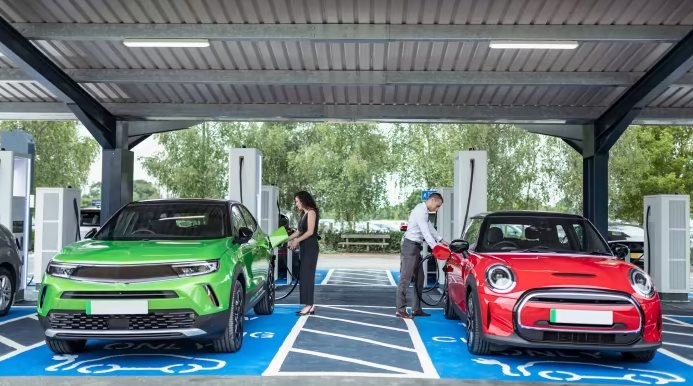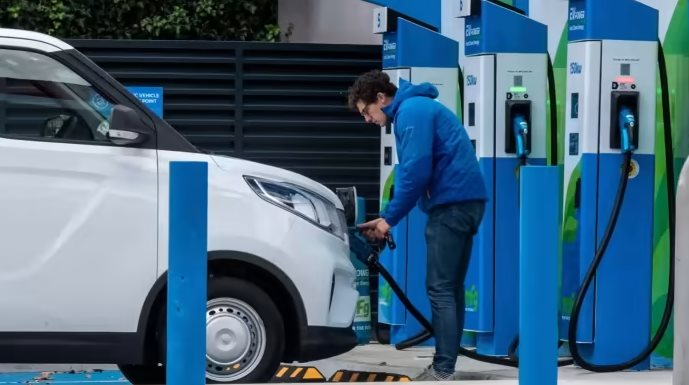The paradox of the electric vehicle industry in Europe: ‘All hands’ develop green cars, but fully charging electric car batteries is more expensive than filling 1 gas tank
- Tram Ho

Illustration
Electricity is expensive
Rapidly rising electricity prices are increasing the cost of driving electric vehicles in Europe and making them more expensive to operate than traditional fuel-powered models – a change that could threaten the transition. to the continental tram.
After the conflict between Russia and Ukraine took place, electricity prices immediately skyrocketed. Rising electricity prices, which economists predict will last for years, have removed a strong incentive for consumers contemplating a switch to electric vehicles, which were once much cheaper than combustion engines. in.
The change comes as some governments are phasing out subsidies for electric vehicle buyers and could slow electric vehicle sales, threaten the bloc’s emissions reduction targets and make carmakers more vulnerable. It is difficult for European cars to recover the high costs of their transition to electric vehicle production.
In Germany, Tesla has raised the price of high-speed chargers several times this year, most recently by 0.71 euros in September according to reports from Tesla owners on industry forums.
At that price, drivers of Tesla’s Model 3 – the most efficient all-electric vehicle in the Environmental Protection Agency’s fuel-use guidelines in the midsize vehicle category, will pay 18.46 euros at a Tesla fast-charging station in Europe for a single charge enough to drive 100 miles.
For comparison, motorists in Germany will pay 18.31 euros in gas to drive a 4-door Honda Civic, the equivalent internal combustion engine model in the EPA’s rankings.
This change is particularly noticeable in Germany, Europe’s largest auto market, where household electricity cost an average of 0.43 euros/kWh in December. This far exceeds France, where consumers have to pays 0.21 euros per kWh in the first half of the year but falls behind Denmark, where one kWh of electricity costs 0.46 euros.

Photo: FT
Many other deciding factors
In fact, the cost of electricity isn’t the only factor that can make electric cars cheaper or more expensive than gas-powered cars. The price of a vehicle, including potential benefits, insurance costs, and maintenance costs, all play a role in the cost equation over the life of the vehicle.
Maria Bengtsson, Ernst & Young’s partner responsible for the company’s electric vehicle business in the UK, says studies of the total cost of ownership of an electric vehicle today show that for the price electricity is much higher, electric vehicles will take longer to become more affordable than conventional vehicles.
So far, there’s no indication that higher electric car charging costs are affecting EV sales. According to the European Association of Automobile Manufacturers, sales of all-electric cars reached 259,449 vehicles in the third quarter, up 11% from the previous quarter and 22% year-on-year in 2021. 3, all-electric cars account for 11.9% of total new car sales in the EU.
In Germany, electricity prices have increased by a third to 0.33 euros/kWh in the first half of this year, and some power companies have announced prices will increase by more than 0.5 euros per kWh in January, according to the office. German federal statistics.
The German government’s independent panel of economic experts forecasts that in the medium term, these prices are likely to fall but will not return to pre-crisis levels, meaning higher costs for owners. Electric vehicle ownership will continue to remain at this level.
Rheinergie, a utility company in Cologne, said in November that it would raise prices to 0.55 euros per kWh in January. In October, EnBW, a regional power company based in Stuttgart, raised the price for a kWh of electricity to 0.37 euros, up 37% from the previous month.
The most expensive way to charge electric vehicles in Europe is to use fast charging stations. Operators such as Tesla, Allego and Ionity have built roadside charging stations along major highways where electric vehicle owners can drive to, plug in and charge their batteries in just 15 minutes.
Fuel economy estimates calculated by the EPA and current gas prices and fees in Europe show that some traditional vehicles now use petrol that is cheaper than comparable electric vehicles using charging stations. fast.
About 80% of electric vehicle charging takes place at home or at work, analysts say, so if an electric vehicle is only used close to home it is usually the least expensive option. But once the vehicle is used for longer road trips, drivers are more likely to use faster charging stations because other options would take too long to charge the battery.
According to WSJ, Bloomberg
Source : Genk
